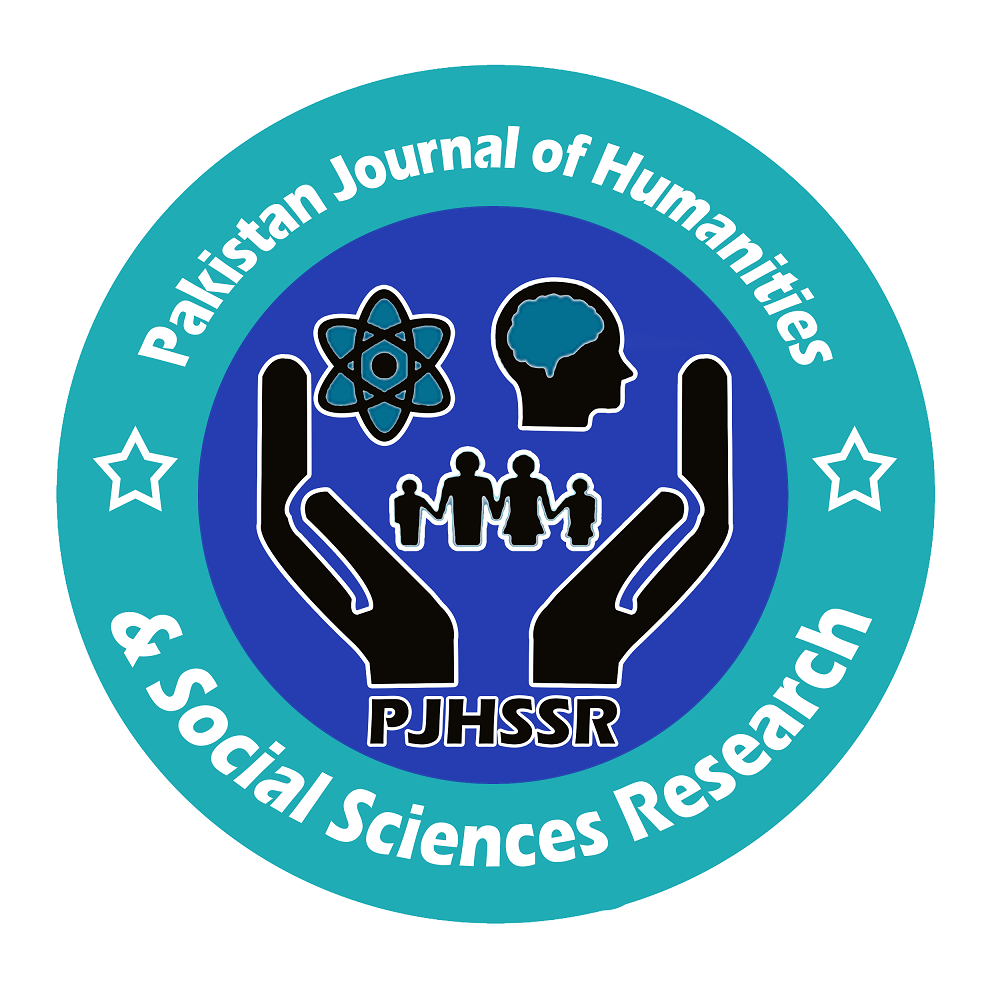DOI: https://doi.org/10.37605/pjhssr.v8i1.1
Abstract
Individuals with disabilities experience poorer mental health outcomes in comparison to their non-disabled counterparts; however, the degree to which disability impacts mental health remains ambiguous. This study employs this dataset to evaluate the correlation between disability and the diagnoses of depression and anxiety, in addition to assessing stress among adult populations. We measured the occurrence of mental health issues among 185 respondents. Chi square analysis estimated the odds of mental health diagnoses among physically disabled and not physically disabled samples. Gender differences were measured using the T test and for relationship among variables, Pearson Coefficient of correlation was used. Physically disabled people have significantly more probabilities of depression, anxiety and stress than nonphysically disabled people, χ 2 (4) = 46.86, p = .000, χ 2 (4) = 76.82, p = .000 χ 2 (4) = 16.79, p = .000 respectively. There are significant means differences for males (M = 15.12, M = 15.96, and M = 13.46) and females (M = 21.12, M = 22.05, and M = 20.42) on depression, anxiety and stress scales respectively. Results show significant correlation among anxiety and depression (r = .86, p = .000), stress and depression (r = .92, p = .000) and between stress and anxiety (r = .89, p = .000). Results support that physically disabled people have lower mental health than nonphysically disabled people.
DOI: https://doi.org/10.37605/pjhssr.v8i1.2
Abstract
This study explores the home- and school-related factors contributing to learning difficulties among primary school students in District Peshawar, Khyber Pakhtunkhwa, Pakistan. Adopting a cross-sectional quantitative design, data were gathered from 1,000 students (Grades 3–5) and 150 teachers across 20 randomly selected public and private schools. Stratified random sampling ensured balanced representation across Union Councils and school types. A validated Learning Difficulties Checklist was used to assess students’ academic challenges, while data on class size, teacher qualifications, and parental education were collected through questionnaires and school records. The analysis revealed a significant relationship between class size and learning difficulties, with larger classes associated with more pronounced academic challenges. Parental education also showed a strong inverse correlation with learning difficulties, indicating that children of more educated parents tend to face fewer academic issues. However, teacher qualification did not have a statistically significant effect on learning outcomes (p = 0.102). These findings underscore the critical roles of class size and parental involvement in addressing learning difficulties, while suggesting that qualifications alone may not reflect a teacher’s effectiveness without considering additional factors like experience and instructional methods.
DOI: https://doi.org/10.37605/pjhssr.v8i1.3
Abstract
This study examines as to how EL (Ethical Leadership) and EI (Emotional Intelligence) affect employees' pro-environmental behavior in their organizations on voluntary basis, and how emotional intelligence amplifies the impact of EL on voluntary PEB of Employees. To conduct the research, quantitative tools and techniques were employed. Data were collected through adapted questionnaires. Systematic random sampling technique was adopted to draw a sample from population of a Public Sector University from Islamabad. Out of 500 questionnaires, 200 were properly filled, and returned. Based on theory of Social learning, it could be concluded tentatively, that EL and EI positively influenced the voluntary PEB of the employees. Smart PLS Software 4.0 was used to analyzed the results which were consistent with the literature. Moreover, future recommendations have also been put across.
DOI: https://doi.org/10.37605/pjhssr.v8i1.4
Abstract
This study was designed to explore the perspectives of university’s students and teachers about the use of ChatGPT in Learning. The research is quantitative in nature. Two selfconstructed questionnaires were used having 40, 40 items. One was designed for students and the second one was designed for teachers. These scales have four perspectives. Acquaintance, Use of ChatGPT in learning/Teaching, Benefits of using ChatGPT and barriers of using ChatGPT. The results indicate that the perspectives of SBBWU university and UOP students are the same. The mean values for teachers suggest a notable difference (19.32) between the two groups, with SBBWU teachers having more positive perspectives on ChatGPT in Learning.
DOI: https://doi.org/10.37605/pjhssr.v8i1.5
Abstract
The research focuses on the academic achievement, social-emotional well-being as well as parental engagement among undergraduate students in five universities in Southern Khyber Pakhtunkhwa, Pakistan that are publicly-operated. Descriptive statistics, t-tests, and ANOVA analysis were used with a sample of 384 students to determine the differences in the responses of students and patterns of parental engagement. The results show that students also show rather positive academic behavior, such as habitual attendance in classes and average academic confidence, but the levels of help-seeking and the involvement in extracurricular activities are low. The results of social-emotional outcomes are moderately stressed, with varying time managing abilities, which indicate that the student support services must be improved. The parental involvement, as measured by communication, guidance, academic and monitoring, was moderate to high in all universities, with parental support being found to be the strongest. Gender comparisons provided higher results where female students felt they had greater parental guidance and support as compared to the male students. The findings of ANOVA also revealed institutional discrepancy in parental involvement which constitutes the socio-cultural and demographic differences of the universities. In general, it can be concluded that the importance of parental involvement is a essential element that affects the performance of undergraduate students, their motivation, and emotional stability. To address the problems, recommendations are suggested, such as enhanced parent-university communication, improved counseling services provided to students, and planned interventions to improve academic and emotional health.
Volume No. 08
Issue No. 01

